Review: Symphony Concert
Conductor: Marvin Kernelle
Artistic Director: David Bester
Venue and date: Guy Butler Theatre, 25 September 2022
By JOHN JACKSON
Although a fortnight has passed since this event, much of the music continues to replay in my head and to my great pleasure. Surely this is some evidence of its success?
Most of the players in the orchestra are music students at NMU and RU, but schoolgoers and older players joined them. The latter were there presumably because of their greater experience, but the advantages in such situations can also work in the opposite direction. As a fairly active (albeit amateur) musician, I learn much from younger musicians and (in many cases) more talented than I am.
These are undoubtedly talented musicians. Each of the works played was demanding in its own way, yet it did not sound as if the players were battling through complex music. Not only are they far advanced in terms of technique, but they also listen carefully to one another. The blend was remarkable for a collection of players who do not regularly perform together and had few joint rehearsals. Artistic director David Bester and conductor Marvin Kernelle would have played vital roles in this success.
There is a very high level of talent and accomplishment among the soloists. Ben Terry, shortly to write Matric, played the opening movement of Elgar’s Cello Concerto. His performance moved me more than has any other of this work. It was Ben’s first appearance as a soloist with a symphony orchestra. Watch this space!
This was also the case with Bayanda Mthetho, a first-year student at RU, who played the last movement of Beethoven’s first piano concerto in a way that was dazzling – and without a score. A wizard who plays by ear? A wizard, yes, but the other day I heard him play – at sight – a difficult accompaniment by Benjamin Britten: it was note-perfect, and Britten’s carefully thought-out dynamics were correctly observed.
The soprano soloist, Lindokuhle Gushu, is a recent graduate of NMU, where she has now embarked on a Master’s degree in the Performing Arts. From her memorable performances of an aria from Catalani’s La Wally and a motet from Mozart’s Exsultate, Jubilate, it is clear that she is equally at home in opera and sacred music. And appropriately, in view of the prominence of young people in this concert, Mozart was still in his teens when he composed this work.
The concert began with a work familiar to many concertgoers: Mendelssohn’s The Hebrides overture. The music (some of Mendelssohn’s finest), together with a little help from one’s imagination, easily took one to Fingal’s Cave: the opening theme was inspired by the sounds of the sea crashing onto the rocks and echoing in the cavern. The last work was the Finale of Dvorak’s Symphony No. 9 (“from the New World”). I have heard it often – several times in the Guy Butler Theatre – and I was delighted to hear it again, especially being played with such energy and passion.
In addition to these fine old favourites, we were treated to the first-ever performance of Arthur Feder’s Moments for Orchestra, composed specifically for this group of musicians. Like Mendelssohn in the concert’s opening work, Feder gives musical expression to what he experiences from nature and his associated mind journeys. Some of the idiom might loosely be called “western”: here and there, I wondered if homage was being paid to Vaughan Williams, among others.
But much of the idiom is drawn from the indigenous music of the Eastern, Northern and Western Cape, including the Uhadi (tapped bow), played by Zanethemba Mdyogolo. Far from any clash between instruments from different cultures, there was the excitement of sound combinations that perhaps were being heard for the first time in the concert hall. Also noteworthy was the use of the piano (played by Catherine Foxcroft) as part of the orchestral fabric rather than as a solo instrument with the backing of an orchestra.
It is likely that, as has happened with several works by another South African, Hendrik Hofmeyr, Feder’s Moments for Orchestra will become part of the concert repertoire. It would be terrific if a high-quality recording of it could be produced and made commercially available.


